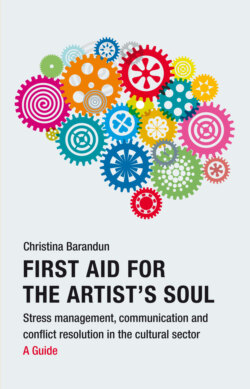Читать книгу First Aid for the Artist's Soul - Christina Barandun - Страница 7
На сайте Литреса книга снята с продажи.
Foreword
Оглавление“I no longer feel so helpless and at the mercy of life’s adversities! It feels good to have ‘tools’ and thus the opportunity to improve something, make life a little easier, a little more joyful!”, a chorister wrote to me after a workshop I had given at a theatre on the subject of “stress management”.
This feedback made me very happy. In my life and in my work as a trainer and coach, I deal with a wide range of people, and experience daily how merely by redirecting our way of thinking and our inner perceptions we can change many things, even though conditions be ever so rigid and adverse. The fact that artists were able to apply this learning successfully within the hierarchical and rigid structures of the theatre reassured and inspired me to focus even more on collaboration with cultural institutions.
If we want to preserve our “German theatre and orchestra landscape”, we must transfer the theatrical structures into the twenty-first century. Although envied and admired by many and nominated by Germany for the international UNESCO List of Intangible Cultural Heritage,1 our German theatre system has in actual fact been in a crisis for quite some time now: underfunding, high illness rates and crushing overwork have created the feeling that it may collapse at any moment.
The social change currently taking place is radical and sometimes frightening, but these new perspectives are opening up exciting possibilities for redesigning creative workplaces, for example as self-organising companies. Theatre could even be a pioneer in the cultural sector in this respect.
In the large theatre-related institutions, potential methods of change are being discussed extensively. At individual theatres, initial structural changes are being implemented, but until they actually take effect, co-workers and artists in the theatres continue to suffer.
With this book, I want to offer artists pragmatic help to find greater self-efficacy2 and satisfaction in the here and now, and within the currently difficult structures. At the same time, I hope that this growing self-efficacy of everyone involved in the artistic operations at the theatre will drive the transformation from the inside, preparing a fertile ground for future necessary changes.
_____
1The application for the nomination of the “German theatre and orchestra landscape” as an immaterial cultural heritage was submitted to UNESCO. The decision will be made in 2021. So far, Germany’s theatre and music landscape has only one entry on the German List of Intangible Cultural Heritage. (See https://www.unesco.de/)
2The concept of self-efficacy expectations was developed by the Canadian psychologist Albert Bandura in the 1970s.
